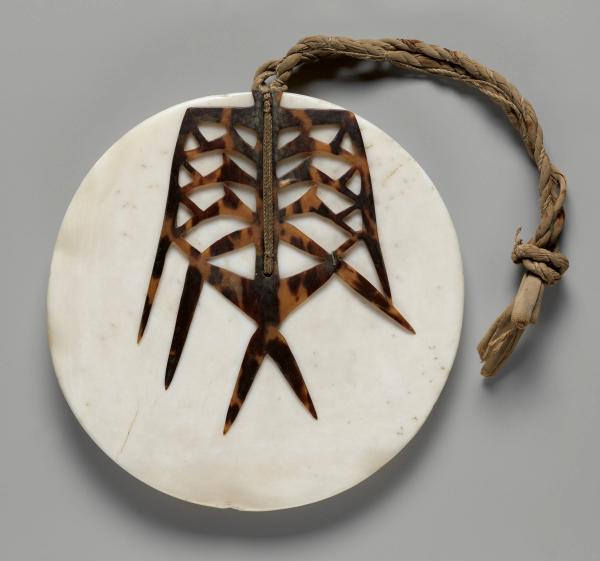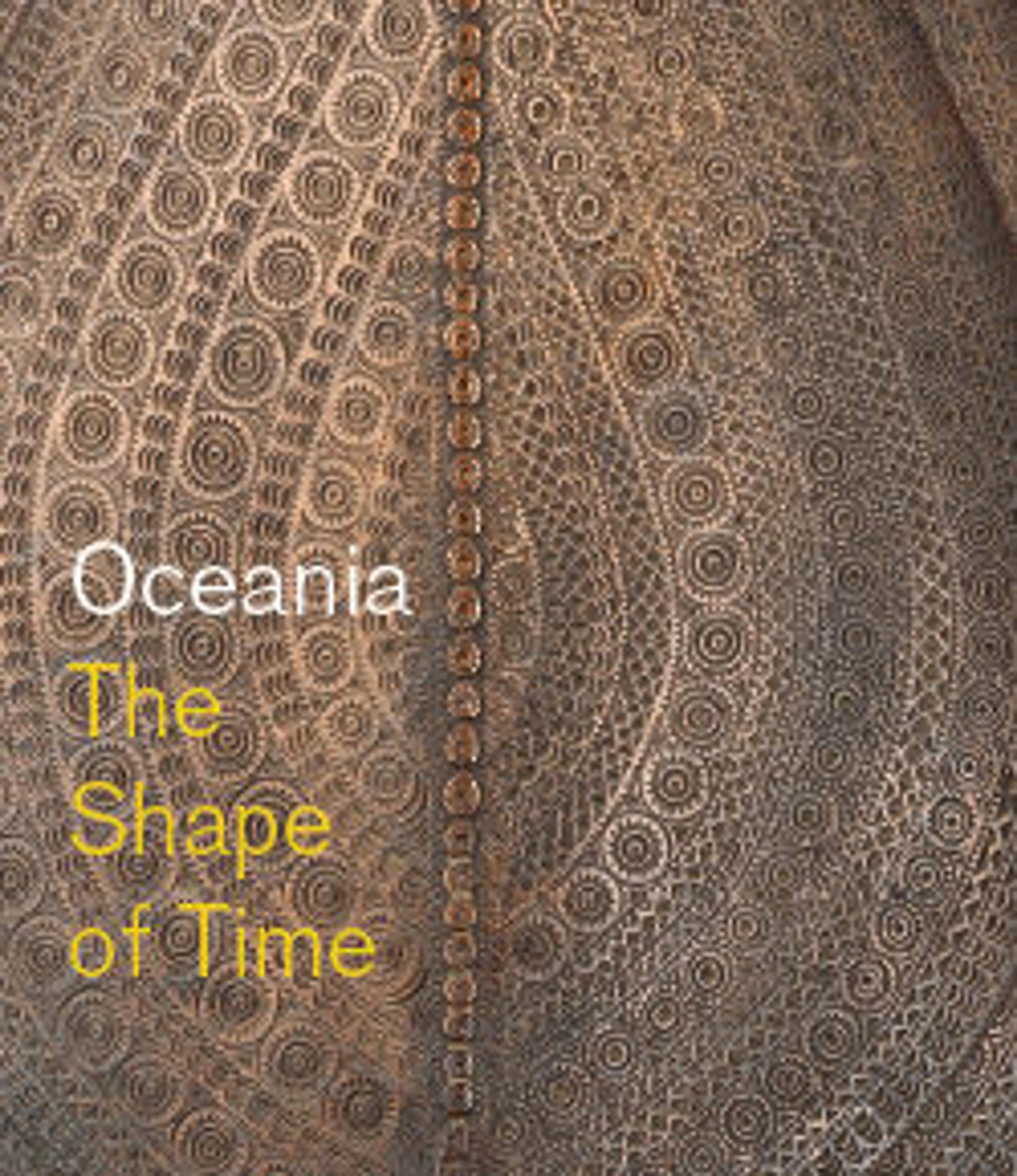Breastplate (Tema, Tambe, or Tepatu)
In the Santa Cruz Islands, part of Temotu Province, one of the most distinctive forms of adornment are tema – breastplates made from the shell of the giant clam (Tridacna gigas) with an overlay of carved turtle shell. Originating from Ndende (Nendö) Island, these necklaces would once have been worn by warriors and men of high status. Today, they are worn by men participating in initiation dances and other ceremonial performances, such as the Nelo dance, where they are worn in pairs with one displayed on the chest of the dancer and one worn on the back. The form of tema is also replicated in contemporary jewelry from Solomon Islands made for both genders.
Each element of these pendants is made by a different specialist. One individual would grind down the Tridacna shell into a perfect disk, while another would carve out the delicate turtle shell design. Unlike the kapkap that are found throughout other parts of Solomon Islands (1999.47.61 ; 1979.206.1473), the turtle shell overlay on tema does not cover most of the Tridacna but rather extends from the top to the center of the disc, where a hole is drilled to allow the overlay to be tied down.
The lower part of the overlay is a representation of distinctive forked tail and ‘M’ shaped wings of the frigatebird. The frigatebird plays an important role in the art and cosmology of Solomon Islands and wider Pacific. As a hunter of the sea and sky, frigatebirds are seen to embody the qualities of a warrior as well as a guide to fishermen. Frigatebirds also herald the annual arrival of large schools of bonito fish, which play a vital role in the economic and ceremonial lives of Solomon Islanders. Above the frigatebird on this tema is a stylized rendition of leaping dolphins stacked in three pairs nose to nose.Artwork Details
- Title:Breastplate (Tema, Tambe, or Tepatu)
- Date:late 19th–early 20th century
- Geography:Solomon Islands, Santa Cruz Islands, Temotu province
- Culture:Santa Cruz Islands
- Medium:Tridacna shell, turtle shell, trade cloth, fiber
- Dimensions:D. 3/16 × Diam. 7 1/2 in. (0.5 × 19.1 cm)
- Classification:Shell-Ornaments
- Credit Line:The Michael C. Rockefeller Memorial Collection, Bequest of Nelson A. Rockefeller, 1979
- Object Number:1979.206.1519
- Curatorial Department: The Michael C. Rockefeller Wing
Audio

1779. Bilas Body Adornments
Shirley Mwanesalua and Patricia George
KATERINA TEAIWA (NARRATOR): The group of objects you see here were made to be worn. They come from the Solomon Islands, where body adornment is one of the most vital forms of cultural expression.
SHIRLEY MWANESALUA: Hello. My name is Shirley, Shirley Mwanesalua. I work as a curator here at the Solomon Islands National Museum. I’ve been here for like ten years now.
PATRICIA GEORGE: My name is Patricia George. I’ve been here for the last 34 years, so quite a long time.
KATERINA TEAIWA: Look for the largest of the round, white ornaments—the shell disk with the turtle-shell inlay. It’s a breastplate, or tema, from Santa Cruz Island.
PATRICIA GEORGE: The word tema comes from the name moon. It’s only used by men.
The man uses the tema during the traditional dancing as part of the dancing costume. So one at the front of the chest and one at the back.
They have feather money sticks on the nose. They have feather money sticks on the head. And they have rattles on both legs…
So when the dancing men sing, they always sing about the nature, about birds.
KATERINA TEAIWA: The turtle-shell inlay at the center of the tema represents a frigate bird...
PATRICIA GEORGE: ...it means peace.
KATERINA TEAIWA: And above the frigate bird, you can see three rows of the tails and fins of diving dolphins.
Now look for the wooden comb decorated with shells.
SHIRLEY MWANESALUA: They’re made of, usually they call the wood palmwood, shell, and fiber. And the teeth is consisting of separate pieces either bound together tightly or glued together by a kind of a resin. It’s a liquid from a nut tree. They use this one to paste the shells onto the wood.
KATERINA TEAIWA: Thread made from coconut fiber binds the comb together. Several of the ornaments in this case may look similar. But they come from different islands and are used for different ceremonial occasions.
SHIRLEY MWANESALUA: In Ulawa and Makira province, this comb on a man is usually worn during traditional initiation ceremony, the Maraufu initiation that prepares boys for manhood. So just like the tema is part of another set of costumes that is usually worn during a ceremony, this one, it’s also part of a costume.
More Artwork
Research Resources
The Met provides unparalleled resources for research and welcomes an international community of students and scholars. The Met's Open Access API is where creators and researchers can connect to the The Met collection. Open Access data and public domain images are available for unrestricted commercial and noncommercial use without permission or fee.
To request images under copyright and other restrictions, please use this Image Request form.
Feedback
We continue to research and examine historical and cultural context for objects in The Met collection. If you have comments or questions about this object record, please contact us using the form below. The Museum looks forward to receiving your comments.
